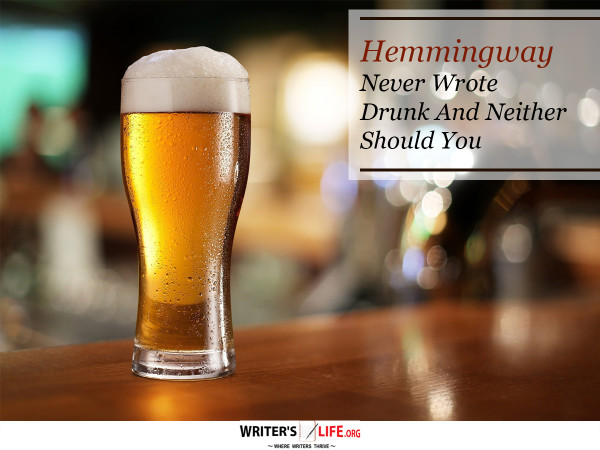- How To Tackle Jealousy In Creative Writing
- Common Submission Mistakes
- How To Stop Your Blog Becoming Boring
- The One Thing Every Successful Writer Has In Common
- How To Make Yourself Aware Of Publishing Scams
- Why Almost ALL Writers Make These Grammar Mistakes At Some Point
- 5 Tips For Authors On How To Deal With Rejection
- Top Mistakes to Avoid When Writing a Novel
- How to Avoid Common New Writer Mistakes
- 10 Mistakes New Fiction Writers Make
Hemingway Never Wrote Drunk And Neither Should You

Share, Pin or Retweet If You Love Writing!
Hemingway never wrote drunk. Despite the quote being misattributed to him, the famous author apparently never said, “Write drunk, edit sober.” And if he did say it, he certainly didn’t practice what he preached.
According to his granddaughter Mariel, “Papa” never wrote while under the influence. “That’s not how he wrote,” she said in an interview. “He never wrote drunk, he never wrote beyond early, early morning.”
So why do people go on believing this about him?
“I think it’s the misperception of addiction and living life on the edge,” Mariel said, “as if it’s cool.”
Obviously, it’s not. Still, the myth of art and addiction persists — and not just for Hemingway.
We all do this. We believe false ideas about what makes a person successful. Athletes put their socks on in the same order every time. Musicians conduct pre-concert rituals that have nothing to do with the music.
Chances are you have your odd quirks, too. We are all weird in our own ways. But why do we think these quirks are what make us creative? They’re not.
Who cares?
Who really cares if Hemingway said this or not? Maybe it’s good to have a bottle of wine beside you while working on a novel. Maybe Don Draper is on to something with the fully-stocked liquor cabinet in the ad agency office. Then again, maybe not.
Such an idea, as harmless as it seems, might be more detrimental than we realize.
“Write drunk, edit sober” is bad advice for two reasons:
- It glorifies addiction. Maybe you’ve never known an addict or been one yourself, but I can tell you — it’s hell. I’ve seen addiction ruin more than one person’s life. It’s not fun or funny. It’s destructive, which is actually the very opposite of creativity.
- It propagates the myth of creativity. It treats art as merely whimsical, not serious. Writing is work, not something silly anybody can do without discipline.
We would never say this of other crafts. You would never nod understandingly if a plumber came to your house, completely wasted, assuring you he’d return to clean up the mess when sober. That would be ridiculous.
But we do this every day with the arts, taking them less seriously than we do other trades. We excuse addiction or obsession as part of the process, not fully understanding the implications of such allowances.
Do the work
Writing, as William Zinsser writes, is a craft. Not some esoteric art we only understand under the influence. It’s hard work and ought to be treated as such.
Do you have the discipline to do the work? Sometimes it's all about organizing your time so that you can stay on schedule as a creative individual. You can find advice inspiration, motivation and the organization skills that you need to stay on track as a happy, fulfilled and productive writer in The Get It Done, Writer's Toolkit. This is an ebook / audio CD combo set that teaches writers how to optimize their performance and make the best of their time whether they are blogging or writing novels.
So why do we persist in believing otherwise? Because it’s easier. It’s more pleasant to protect ourselves from the pain than to face the work we dread. We are, in essence, procrastinating when we rattle of such quotes as, “write drunk, edit sober.”
Maybe this is because we like the idea of creativity more than the work it requires. That’s often true for me. I would rather call myself a writer and enjoy the prestige and attention that attracts than get up before sunrise to write a blog post.
One has the appearances of being creative without the discomfort. And isn’t that what we all want, sometimes? To look a certain way without having earned it?
So here is my wish for you. If you aspire to be creative, may you not hide behind cliches but instead do the brave, beautiful work of making something new. In the end, it’s more rewarding than merely talking about it.
This article by Jeff Goins originally appeared under the title of Write Drunk, Edit Sober is Bad Advice at http://goinswriter.com/write-drunk/.

























